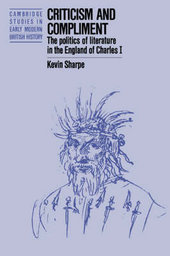
|
Criticism and Compliment: The Politics of Literature in the England of Charles I
Paperback / softback
Main Details
Description
Criticism and Compliment examines the poems, plays and masques of the three figures who succeeded Ben Jonson as authors of court entertainments in the England of Charles I. The courtly literature of Caroline England has been dismissed by critics and characterised by historians as propaganda for Charles I's absolutism penned by sycophantic hirelings. Kevin Sharpe questions the assumptions on which these evaluations have been based. Challenging the traditional argument for a polarity between court and country cultures in early Stuart England, he re-reads the plays, poems and masques as primary documents of political attitudes articulated at court. Far from being confined to a decade or a party, the courtly literature of the 1630s is relocated within the broader humanist tradition of counsel. Through the language of love - a language, it is argued, that was part of the discourse of politics in Caroline England - the court poets criticised fundamental premises of the King's political ideology, and counselled traditional and moderate modes of government.
Reviews'... a masterly study, one which opens up new perspectives on politics, literature, and kingship in early modern England.' English Historical Review 'Sharpe's book, as might be expected of this lively, hard-hitting author, is provocative and challenging ... Sharpe's exciting and innovative book can be warmly recommended to those interested in the re-mapping of the familiar territory of early Stuart political history.' The Historian 'An illuminating study of Caroline court culture that provocatively challenges received ideas about the relationship of culture to politics in early Stuart England ... His sophisticated and intelligent discussion of the Caroline masques is probably the best essay yet produced on the topic ... Sharpe's book ... is also written with enviable boldness and clarity. No student of Stuart literature or politics can afford to neglect it.' Modern Europe
|